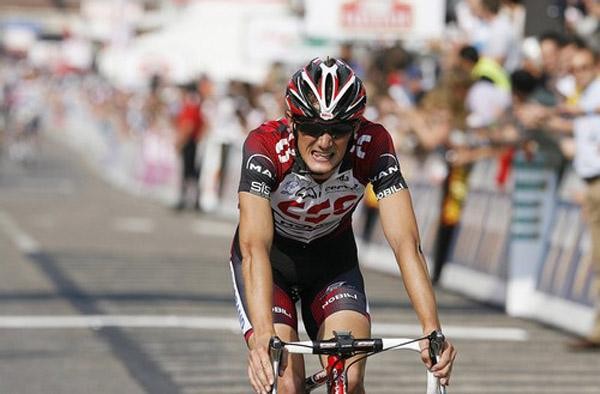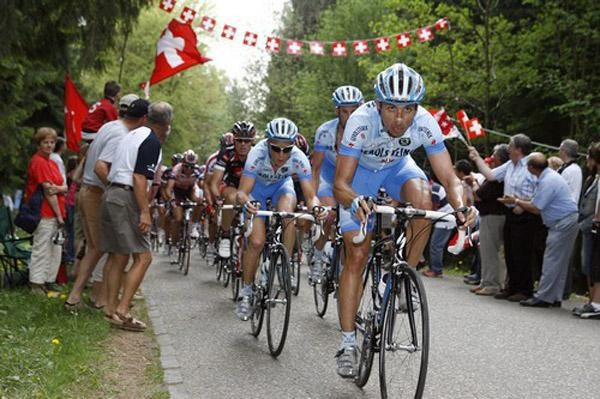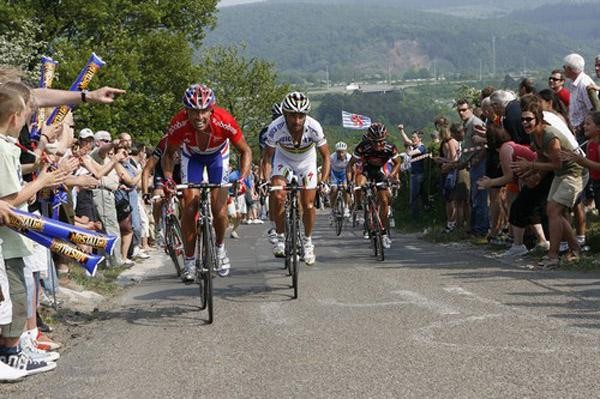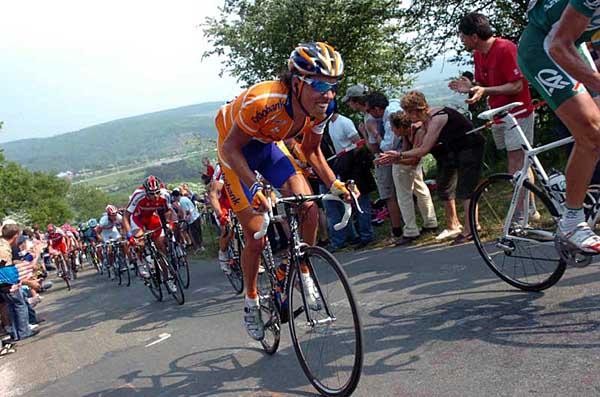Post Liège reactions
By Brecht Decaluwé in Ans Schleck rides with cracked vertebra, happy with third "On Saturday my back...




By Brecht Decaluwé in Ans
Schleck rides with cracked vertebra, happy with third
"On Saturday my back hurt a lot and after examination it was revealed that I have a broken vertebra. I offered up so many things to get to this race so I wanted to start. I attacked at the right moment but Di Luca was stronger on the final climb. I'm happy with my third place. I've dreamed about winning this race in the past so I hope to come back here and realize my dream," Schleck said to Sporza.
In a first reaction after the race Fränk Schleck was hammered. "It was so fast, so hard," Schleck sighed. When asked if Di Luca exploited his hard work in the final kilometre, Schleck wasn't angry on the Italian winner. "Di Luca had the right to ride like that. Anyway, if I would've been stronger I would've won," Schleck said to Cyclingnews at the finish line before heading to the podium.
Gerolsteiner content
Gerolsteiner did a good share of the work to bring back the breakaway late in the race, and had a good chance with Stefan Schumacher's attack, but had to be satisfied with Rebellin's fifth place. ""We can really be very satisfied with these results. For me, it was the strongest team performance to date. We have never had such a strong team here," said director Christian Henn.
Stefan Schumacher: "We can live well with Davide's fifth place. That was a good result to end up our strong week in the Ardennes." Schumacher, as to why his escape near the end of the race wasn't successful: "It's too bad that the others in my leading group didn't want to share the work and lead." He tried it on his own, "but in the end I just didn't have enough left."
Get The Leadout Newsletter
The latest race content, interviews, features, reviews and expert buying guides, direct to your inbox!
"When I had [just] 30 seconds, I knew that it would be really, really difficult," he told Cyclingnews after the finish. "If I had some luck and if maybe there were some attacks from the favourites and they neutralized each other, then perhaps I would have had a chance. But in this situation, the race was very controlled and so many teams were working for their leaders."
Dekker: "Banning the earphones? We should really try it once!"
Erik Dekker, the current team director for Rabobank, was disappointed that while his team has a history of taking the initiative in races such as Amstel Gold Race, nobody did it in Liège. "The biggest problem is that the riders are too good. The Weening and Moerenhout riders of this peloton are too good and the best riders are waiting for the last climb. That's a huge deadlock," Dekker said.
The Dutchman has experience in this race, finishing fifth back in 2004. "Normally the race starts on the Côte de Wanne but at that moment we were trailing the front group by 16'. You can only start the battle when there's a battle possible. All the riders rode as if the foot of the St-Nicolas was their finish line, doing everything to deliver their leader to the front," Erik Dekker said.
Dekker said that he knew the race would remain deadlocked up until the final climbs right from the La Redoute. "If you reach the foot of that climb with 100 men, then you know that the race wasn't hard enough."
The Rabobank director said there were no attacks before that last climb except for the effort from Schumacher. "He did a great effort, but the chance that he would make it was very small. I was never worried by him because he had to work so hard on the descent that he couldn't survive the ultimate climbs, even if he would've had forty seconds," Dekker explained. When someone asked if a ban on radio communication for the riders would make sense, Dekker loved the idea. "We should really try it once!"
No results but progression for Thomas Dekker
Rabobank's young talent Thomas Dekker (no relation to Erik) showed great things in Liège-Bastogne-Liège. He was in the big front group at the foot of Saint-Nicolas, but he was still there with about seven other riders after the first acceleration, when Bettini attacked. "You just try to follow everyone and just before Schleck attacked there was a Boogie [Michael Boogerd - ed.] attack. I was riding in eighth position, just hanging on when Schleck attacked," the young Dekker explained.
There was no response on the Schleck/Di Luca attack until Dekker tried to bridge up on his own. "I could see them riding but I couldn't close the gap," Dekker said. "The roads in Belgium aren't good and I was rattling down the St-Nicolas, if this would've been in the Tour de France it would've been easier. Also, if I could've reacted to that attack a split second earlier then I could've made it," Dekker said to Cyclingnews.
"Then I would've stayed on the wheels, even if that would end up in a third place. It didn't happen like that though, and I was brought back in the final kilometre. I noticed that Schleck was pulling hard so it was just impossible against two men for me," Dekker realized.
"I'm happy with my performance; I'm riding between these big names at this young age. It makes me feel even better that I can ride away from them after 260 kilometres. Nevertheless it's a pity that I can't pull off a decent result [Dekker finished 34th - ed].
"Last year I finished 19th, but that was in another style. Now I brought back Bettini and reacted to those two leaders. I can look back with a big smile on my performances during the Ardennes week: in the Amstel Gold Race I crashed but still managed to finish 12th, in Flèche Wallonne I was brought back at the foot of the Mur and today I was brought back during the final kilometre again," Dekker reflected on the past week. "I don't have to blame myself for anything so I'm only to the future, now I want to be good in Switzerland."
Race style not in Horner's favour
Last year Predictor-Lotto's Chris Horner was in the front group that sprinted for the victory, but this year he was unable to fight for the win. "A top-20 was possible though, and on Saint-Nicholas I tried 100% to get back to the leaders as there was a small gap, but I had at least five guys on my wheel.
"First I thought that it was great and that we would work together to get back to the leaders but they stopped working! You've got to be crazy," Horner was disappointed by the lack of help. "I went really hard on that climb, averaging 40km/h during two uphill kilometres," Horner said.
Horner found that there were too many fresh legs in the peloton at the finish, "The race was a bit too easy, it had to be faster for me. Cruising at the back and then smashing up the final climb is not my cup of tea," Horner said to Cyclingnews. "A team had to do something to make it harder, but nobody drilled it. Having such a big group at the foot of the final climb is like sitting behind a truck, that isn't too hard. Riding behind a car is better, then there are less people following," Horner laughed.